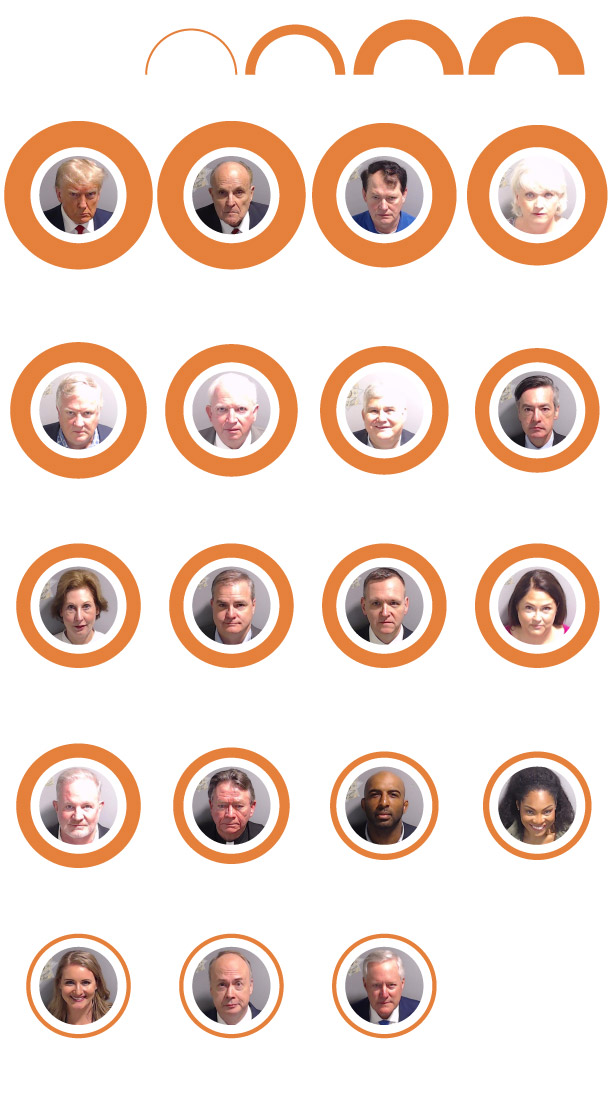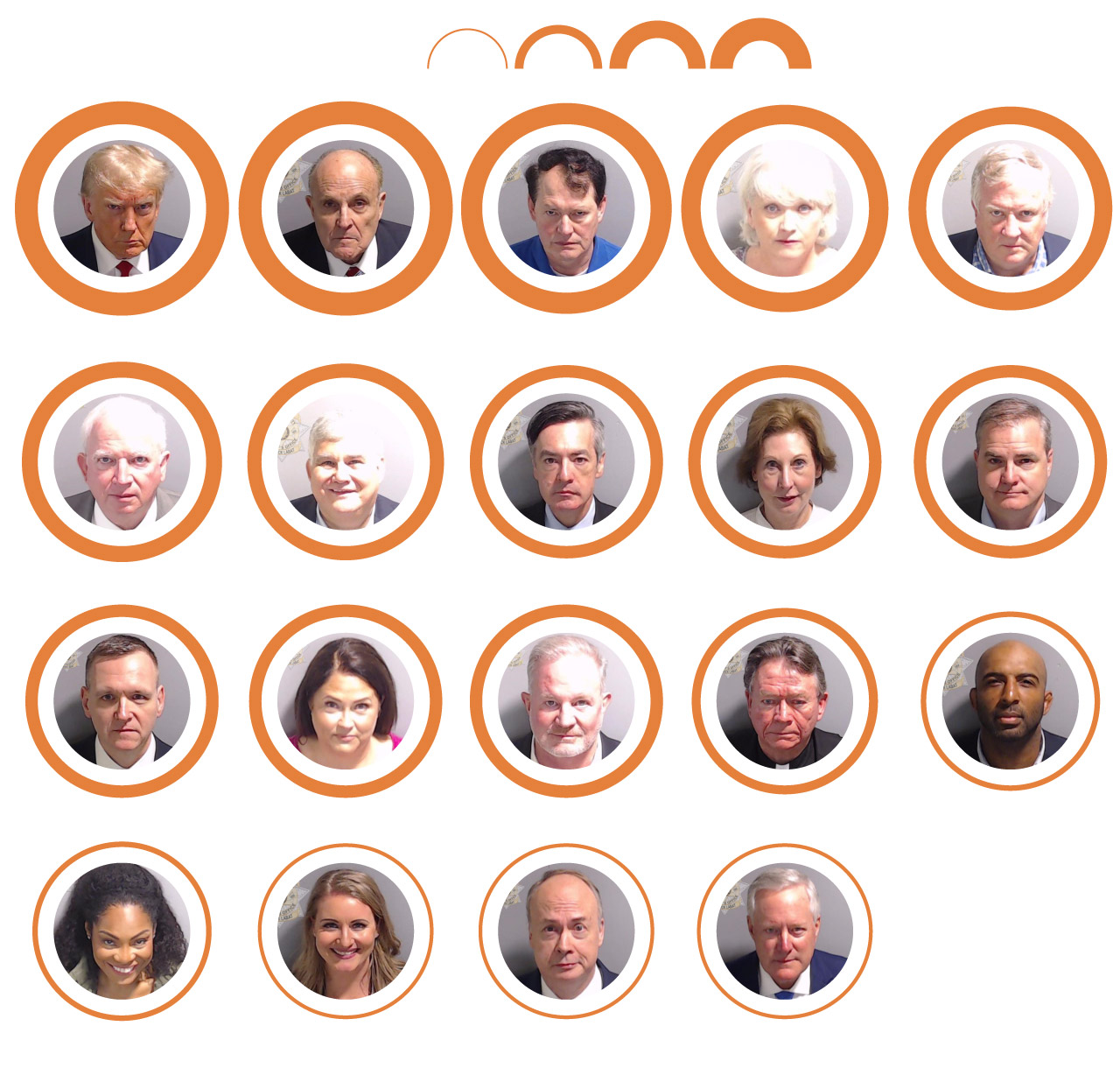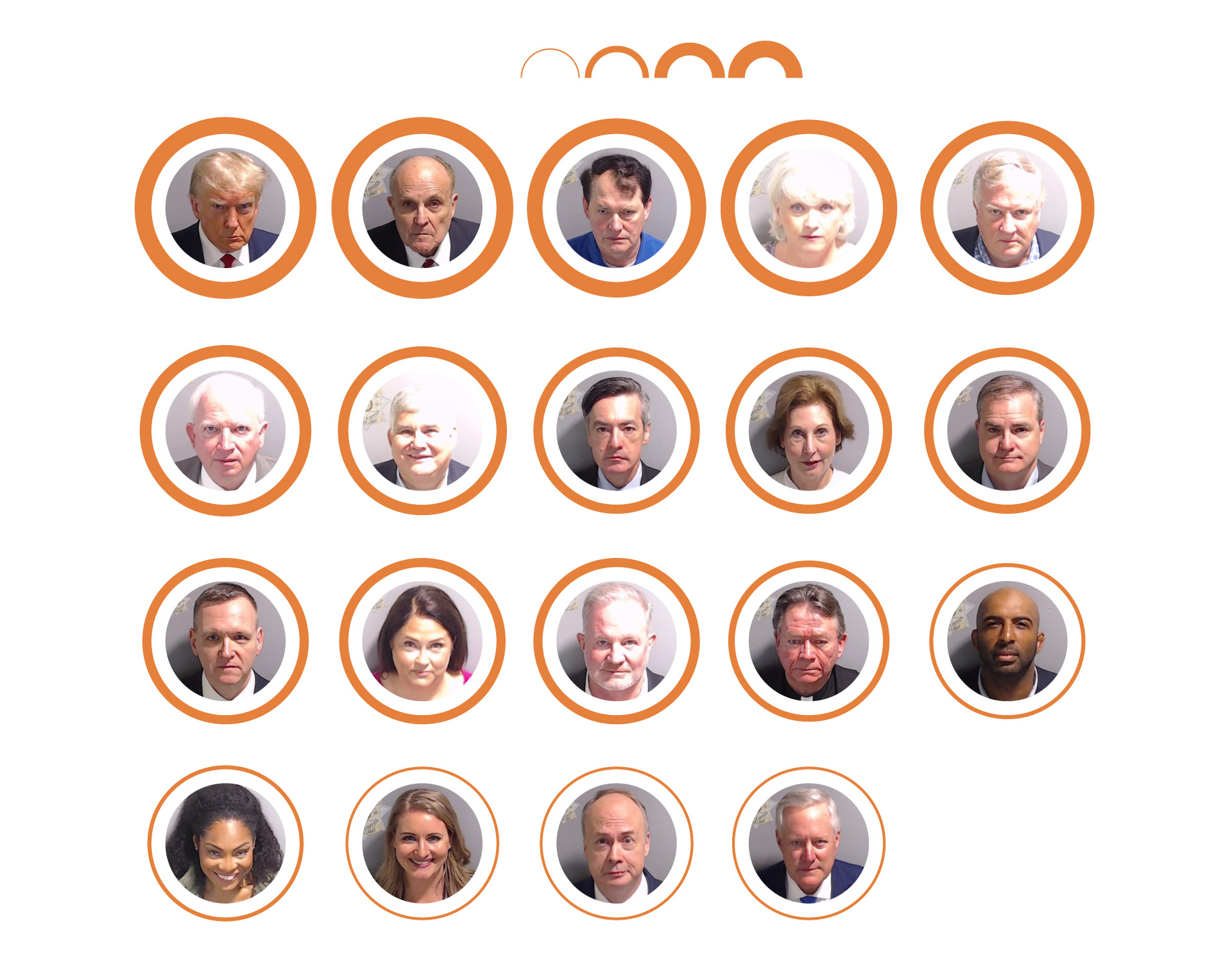We’d love to hear from you along the way. Please email us with feedback — perry.stein@washpost.com and devlin.barrett@washpost.com — and questions you’d like us to answer.
Let’s get started:
Pretrial-palooza has officially begun, with hearings expected at least in Florida and Georgia this week, along with court filings and potentially more grand jury activity in D.C.
To help you keep track of the four — yes, four — pending criminal Trump trials, here is a guide to what comes next, followed by a recap of what happened last week.
Looking ahead:
- In Georgia, where Trump and 18 co-defendants face state charges for trying to overturn Joe Biden’s 2020 victory, the judge schedules weekly hearings to review the many requests he is getting from defendants and prosecutors. At Thursday’s hearing, we may get more insight into when Trump will go on trial there.
- Sometimes lawyers and judges decide to argue an issue under seal — meaning the public doesn’t get to see the particulars. One such fight erupted last week in D.C., where Trump faces federal charges of trying to block the election results. Prosecutors and defense lawyers are expected to file court papers in the dispute this week.
- The fight is related to Trump’s “daily extrajudicial statements,” prosecutors say. The term sounds cool, but they actually mean it in a bad way — that Trump is speaking out of school on his case, something the Justice Department has complained about before.
- That’s not the only legal issue potentially being dealt with behind closed doors this week. Lawyers in the Florida indictment, which involves alleged mishandling of sensitive documents, are overdue for a sealed hearing on the classified evidence the government plans to present.
Now a recap from last week:
Georgia: State case on 2020 election
The details: Trump faces 13 state charges, with prosecutors alleging that he tried to undo the election results in that state. He was charged along with 18 other people.
What you need to know: A judge unsealed papers revealing that a special grand jury originally recommended indicting many more people, including: Sen. Lindsey O. Graham, (R-S.C.) former senators David Perdue and Kelly Loeffler, both Georgia Republicans, as well as Trump campaign attorneys Cleta Mitchell and Boris Epshteyn and former Trump national security adviser Michael Flynn.
Prosecutors told Fulton County Superior Court Judge Scott McAfee they expect it to take up to four months to try those who were charged. That’s because they have 150 witnesses to call to the stands. 150! Let’s see, 150 times 19 cross-examinations adds up to … forever. Roughly forever. And potentially right in the middle of Trump’s 2024 presidential campaign.
- At the hearing, McAfee granted a request from two defendants, former Trump campaign attorneys Kenneth Chesebro and Sidney Powell, for their trial to start soon, on Oct. 23. District Attorney Fani T. Willis says she could meet that deadline and wants all 19 co-defendants to go to trial together then. Our colleague Holly Bailey reported that McAfee appeared extremely skeptical that all 19 would be ready. Stay tuned.
Trump said in a filing that he may seek to move the Georgia case from state to federal court. His co-defendant and former chief of staff, Mark Meadows, has been unsuccessful so far in that effort.
- Meadows’s argument — which Trump would presumably make as well — was that the allegations laid out in the Georgia indictment occurred while he was carrying out his duties as a federal official and he is thus protected by federal law. But a judge ruled Friday that Meadows’s actions were on behalf of Trump’s presidential campaign and did not fall within his chief-of-staff duties.
Also last week, Trump and several co-defendants waived their right to in-person arraignments and entered not-guilty pleas in writing. Here’s how many charges all 19 face.

Number of
charges
1
5
10
13
13 Donald
Trump
13 Rudy
Giuliani
12 Ray
Smith
11 Cathy
Latham
10 Robert
Cheeley
9 John
Eastman
8 David
Shafer
7 Kenneth
Chesebro
7 Misty
Hampton
7 Sidney
Powell
7 Shawn
Still
7 Mike
Roman
3 Trevian
Kutti
7 Scott
Hall
5 Stephen
Lee
3 Harrison
Floyd
2 Jenna
Ellis
2 Jeffrey
Clark
2 Mark
Meadows

Number of
charges
Number of
charges
1
1
5
5
10
10
13
13
13 Rudy Giuliani
13 Donald Trump
12 Ray Smith
11 Cathy Latham
10 Robert Cheeley
7 Kenneth Chesebro
7 Sidney Powell
7 Shawn Still
9 John Eastman
8 David Shafer
7 Mike Roman
7 Misty Hampton
7 Scott Hall
5 Stephen Lee
3 Harrison Floyd
3 Trevian Kutti
2 Jenna Ellis
2 Jeffrey Clark
2 Mark Meadows

Number of
charges
1
5
10
13
13 Rudy Giuliani
13 Donald Trump
12 Ray Smith
11 Cathy Latham
10 Robert Cheeley
7 Kenneth Chesebro
7 Sidney Powell
7 Shawn Still
9 John Eastman
8 David Shafer
7 Mike Roman
7 Misty Hampton
7 Scott Hall
5 Stephen Lee
3 Harrison Floyd
3 Trevian Kutti
2 Jenna Ellis
2 Jeffrey Clark
2 Mark Meadows
D.C.: Federal case on 2020 election
The details: Trump faces four federal charges for alleged efforts to overturn the results of the 2020 election.
What you need to know: The biggest D.C. courthouse news last week was only tangentially related to Trump. Former Proud Boys leader Henry “Enrique” Tarrio, who helped organize the Jan. 6, 2021, attack of the U.S. Capitol by Trump supporters trying to block Biden’s victory, was sentenced to 22 years in prison.
- The Tarrio sentence is longest yet for any Jan. 6 suspect. He had a prior criminal record, which typically results in longer sentences.
- Tarrio was not physically at the Capitol attack. Still, he was convicted of multiple crimes, including seditious conspiracy and obstruction of an official proceeding.
- This is the latest example of a jury willing to convict someone for actions that led to the Jan. 6 attack — even if they did not physically participate in it. Trump, who also wasn’t at the Capitol on Jan. 6, was not charged with seditious conspiracy. But both he and Tarrio were charged with obstructing an official proceeding: the counting of electoral votes at the Capitol.
The D.C. grand jury that voted to indict Trump continued to meet last week, an indication that the investigation continues and additional indictments are possible.
Florida: Federal classified-documents case
The details: Trump faces 40 federal charges over accusations that he kept top-secret government documents at Mar-a-Lago — his home and private club — and then thwarted government demands that he return them. Two Trump employees were also charged.
What you need to know: Federal prosecutors and lawyers representing Trump’s two co-defendants kept arguing over whether the lawyers have represented too many witnesses in the case to fairly advise their clients. The government wants Judge Aileen M. Cannon to hold a hearing about it. The lawyers say that’s unnecessary. These types of disputes are fairly common, but this one has become a weeks-long, drawn-out debate.
- In the latest filing, one of the defense attorneys confirmed his former client has been cooperating with the government. (We have identified the former client as Mar-a-Lago IT worker Yuscil Taveras)
- This isn’t that surprising. We already knew that Taveras’s testimony in July about alleged efforts to delete security footage led to prosecutors filing additional charges against Trump. But this is the first time we have seen in writing that Taveras entered into a “cooperation agreement” with the government to avoid charges.
New York: State business-fraud case
The details: Trump faces 34 state charges in connection with hush money paid to adult-film actress Stormy Daniels during the 2016 campaign.
That stage was dark again last week. But in an unrelated civil lawsuit, a judge found Trump liable for defaming writer E. Jean Carroll in 2019 after she accused him of raping her decades earlier. Jurors will only consider whether and how much Trump owes Carroll in damages when that trial starts in January.
Nerd word of the week
The nerd word of the week is … interlocutory: It’s a type of appeal that defendants may file before a trial is concluded. Interlocutory appeals are both rare and rarely successful, because in most instances, courts don’t let defendants file appeals before a final trial judgment has been issued.
When Trump claimed recently he would appeal a March 4 trial date for his case in Washington, legal experts quickly shot that idea down as unworkable. Trump’s best shot at an interlocutory appeal in his D.C. trial, they say, is the question of whether his actions while president were covered by executive immunity.
More about that from Devlin here.
Thanks for reading our newsletter. Have questions about the cases? Email us and we will try to answer some in next week’s edition!







No comments:
Post a Comment